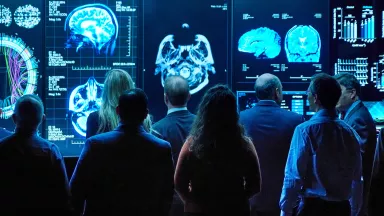What Is Language Processing Disorder?
Language processing disorder is a type of learning disability. Learning disabilities are characterized by significant limitations both in intellectual functioning and in adaptive behavior as expressed in conceptual, social and practical adaptive skills. Such disabilities typically originate before age 18.
Over the past decade, important changes have been made in disability terminology, resulting in the renaming of mental retardation to intellectual disability. Though this disability, which has a major impact on a patient’s life, is sometimes hard to diagnose, medical science has developed a better understanding of its causes.
Learning disabilities are disorders that affect the ability to:
- Understand or use spoken or written language
- Do mathematical calculations
- Coordinate movements
- Direct attention
Learning disabilities occur in very young children, yet they are usually not noticed until the child reaches school age. Learning disabilities can be lifelong conditions with a range of impacts and accommodation requirements.
In some people, several overlapping learning disabilities may occur, with frequent overlap of attention-deficit disorder (ADD) and attention-deficit/hyperactivity disorder (ADHD) diagnoses. Other people may have a single, isolated learning problem that has little impact on their lives.
There is some incidence of learning disabilities in adults, such as adult-onset dyslexia. This usually occurs as a result of brain injury or dementia. However, some adults with dyslexia were never diagnosed with dyslexia as children or adolescents. Dyslexia can be inherited; recent studies have identified a number of genes that may predispose a person to developing dyslexia.
Children are born ready to learn a language, but they need to learn the language or languages that their family and environment use. Learning a language takes time, and children vary in how quickly they master milestones in language and speech development. Typically developing children may have trouble with some sounds, words and sentences while they are learning. However, most children can use language easily around five years of age.
Some children struggle with understanding and speaking, and they need help. They may not master the language milestones at the same time as other children, and it may be a sign of a language or speech delay or disorder.
Language development has different parts, and children might have problems with one or more of the following:
- Understanding what others say (receptive language). This could be due to:
- Not hearing the words (hearing loss)
- Not understanding the meaning of the words
- Communicating thoughts using language (expressive language). This could be due to:
- Not knowing the words to use
- Not knowing how to put words together
- Knowing the words to use but not being able to express them
Language and speech disorders can exist together or by themselves. Examples of problems with language and speech development include:
- Speech disorders
- Difficulty with forming specific words or sounds correctly
- Difficulty with making words or sentences flow smoothly, like stuttering or stammering
- Language delay (the ability to understand and speak develops more slowly than is typical)
- Language disorders
- Aphasia (difficulty understanding or speaking parts of language due to a brain injury or how the brain works)
- Auditory processing disorder (difficulty understanding the meaning of the sounds that the ear sends to the brain)
Types of Language Processing Disorders
The three types of language processing disorders are defined by how we interpret what is being communicated to us by others, and how we communicate to others verbally. The three types are:
- Receptive Language Disorder: Trouble following instructions, doesn’t seem to be listening when someone is talking
- Expressive Language Disorder: Delayed response to answering questions, trouble recalling a word, problems with reading comprehension, incorrect use of tenses, off-topic responses to questions
- Language Disorder: Challenges with how the brain processes language
Causes of Language Processing Disorders
Most developmental disabilities are thought to be caused by a complex mix of factors. These factors include genetics, parental health and behaviors (such as smoking and drinking) during pregnancy, complications during birth, infections the mother might have during pregnancy or the baby might have very early in life, and exposure of the mother or child to high levels of environmental toxins, such as lead. For some developmental disabilities, such as fetal alcohol syndrome, which is caused by drinking alcohol during pregnancy, we know the cause. But for most, we don’t.
Language processing disorder (LPD) is sometimes caused by birth defects, including Down syndrome (trisomy 21) or cerebral palsy. Additionally, LPDs may be a result of autism or medical conditions like brain injuries, brain tumors or strokes.
Risk Factors for Language Processing Disorders
Most developmental disabilities are thought to be caused by a complex mix of factors. These factors include genetics, parental health and behaviors (such as smoking and drinking) during pregnancy, complications during birth, infections the mother might have during pregnancy or the baby might have very early in life, and exposure of the mother or child to high levels of environmental toxins, such as lead. For some developmental disabilities, such as fetal alcohol syndrome, which is caused by drinking alcohol during pregnancy, we know the cause. But for most, we don’t.
Developmental disabilities begin any time during the developmental period and usually last throughout a person’s lifetime. Most developmental disabilities begin before a baby is born, but some can happen after birth because of injury, infection or other factors.
Screening for & Preventing Language Processing Disorders
Healthcare providers can play an important part in collaborating with schools to help a child with learning disorders or other disabilities get the special services they need. The American Academy of Pediatrics (AAP) has created a report that describes the roles that healthcare providers can have in helping children with disabilities, including learning disorders.
If a child has a problem with language or speech development, talk to a healthcare provider about an evaluation. An important first step is to find out if the child may have hearing loss. Hearing loss may be difficult to notice, particularly if a child has hearing loss only in one ear or has partial hearing loss, which means they can hear some sounds but not others.
A language development specialist like a speech-language pathologist will conduct a careful assessment to determine what type of problem with language or speech the child may have.
Signs & Symptoms of Language Processing Disorders
Language or speech disorders can occur with other learning disorders that affect reading and writing. Children with language disorders may feel frustrated that they cannot understand others or make themselves understood, and they may act out, act helpless or withdraw. Language or speech disorders can also be present with emotional or behavioral disorders, such as attention-deficit/hyperactivity disorder (ADHD) or anxiety. Children with developmental disabilities including autism spectrum disorder may also have difficulties with speech and language. The combination of challenges can make it particularly hard for a child to succeed in school. Properly diagnosing a child’s disorder is crucial so that each child can get the right kind of help.
Diagnosing Language Processing Disorders
If a child has a problem with language or speech development, talk to a healthcare provider about an evaluation. An important first step is to find out if the child may have hearing loss. Hearing loss may be difficult to notice, particularly if a child has hearing loss only in one ear or has partial hearing loss, which means they can hear some sounds but not others.
A language development specialist like a speech-language pathologist will conduct a careful assessment to determine what type of problem with language or speech the child may have.
Overall, learning more than one language does not cause language disorders, but children may not follow exactly the same developmental milestones as those who learn only one language. Developing the ability to understand and speak in two languages depends on how much practice the child has using both languages, and the kind of practice. If a child who is learning more than one language has difficulty with language development, careful assessment by a specialist who understands development of skills in more than one language may be needed.
Children with learning disorders may feel frustrated that they cannot master a subject despite trying hard, and they may act out, act helpless or withdraw. Learning disorders can also be present with emotional or behavioral disorders, such as attention-deficit/hyperactivity disorder (ADHD), or anxiety. The combination of problems can make it particularly hard for a child to succeed in school. Properly diagnosing each disorder is crucial so that the child can get the right kind of help for each.
Many children may struggle in school with some topics or skills from time to time. When children try hard and still struggle with a specific set of skills over time, it could be a sign of a learning disorder. Having a learning disorder means that a child has difficulty in one or more areas of learning, even when overall intelligence or motivation is not affected.
Children with a displayed lack of achievement may be diagnosed just as commonly as those of average or above-average intelligence. Discrepancies may exist from one type of diagnosis to another, with variations depending on the individual. Learning disabilities and deficiencies in information processing can make learning and communication challenging or impossible.
Treating Language Processing Disorders
Children with language problems often need extra help and special instruction. Speech-language pathologists can work directly with children and their parents, caregivers and teachers.
Having a language or speech delay or disorder can qualify a child for early intervention (for children up to three years of age) and special education services (for children aged three years and older). Schools can do their own testing for language or speech disorders to see if a child needs intervention. An evaluation by a healthcare professional is needed if there are other concerns about the child’s hearing, behavior or emotions. Parents, healthcare providers and the school can work together to find the right referrals and treatment.
Children with learning disorders often need extra help and instruction that are specialized for them. Having a learning disorder can qualify a child for special education services in school. Schools usually do their own testing for learning disorders to see if a child needs intervention. An evaluation by a healthcare professional is needed if there are other concerns about the child’s behavior or emotions. Parents, healthcare providers and the school can work together to find the right referrals and treatment.
The most common treatment for learning disabilities is special education. Specially trained teachers may perform a formal assessment to understand the child's academic and intellectual potential. They will also look at the level of academic performance. Once the evaluation is complete, the basic approach is to teach learning skills by building on the child's abilities and strengths while correcting disabilities and weaknesses. Other professionals such as speech and language therapists also may help. Some medications may help the child learn by enhancing attention and concentration. Psychological therapies may also be used.
Living with Language Processing Disorders
Children with specific learning disabilities, including language or speech disorders, are eligible for special education services or accommodations at school under the Individuals with Disabilities in Education Act (IDEA), an anti-discrimination law.
Healthcare providers can play an important part in collaborating with schools to help a child with speech or language disorders and delay or other disabilities get the special services they need.
To develop a better understanding of your diagnosis, consider participating in a clinical trial so clinicians and scientists can learn more about learning disabilities and related disorders. Clinical research uses human volunteers to help researchers learn more about a disorder and perhaps find better ways to safely detect, treat or prevent disease.
All types of volunteers are needed—those who are healthy or may have an illness or disease—of all different ages, sexes, races and ethnicities to ensure that study results apply to as many people as possible, and that treatments will be safe and effective for everyone who will use them.
For information about participating in clinical research, visit NIH Clinical Research Trials and You. Learn about clinical trials currently looking for participants at Clinicaltrials.gov.




